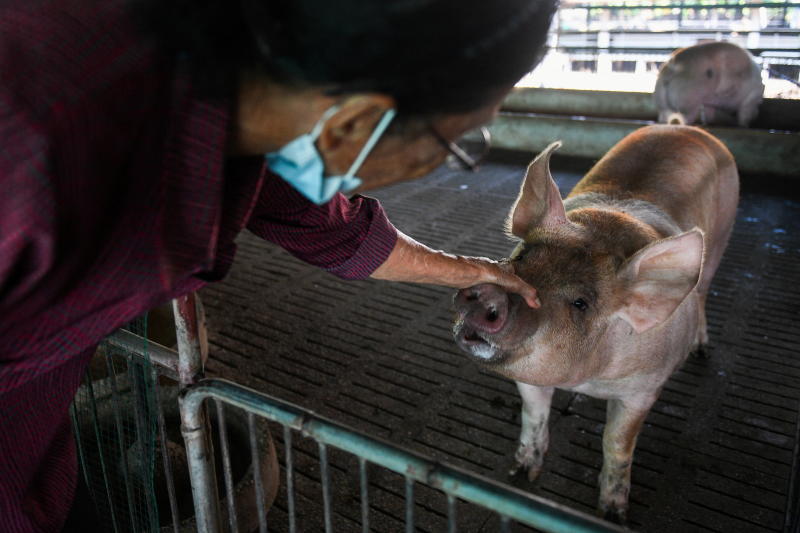Business began unravelling for pig farmer Jintana Jamjumrus two years ago, after dozens of her animals got feverish and died within days of a mysterious illness she suspected of being a viral disease with no known vaccine, African swine fever (ASF).
This month, officials identified the first case of ASF in Ms Jintana’s province of Nakhon Pathom, after years of saying it was not in Thailand, unleashing a political firestorm as pork prices hit an all-time high near which they may stay for months.
“There’s no way they didn’t know. Pigs died all over the country … Why the cover-up?” Ms Jintana, 75, asked about the deaths in previous years. “What can they do now? There’s nothing left.”
In parliament, an opposition lawmaker accused the government of a years-long cover-up, though a deputy agriculture minister denied this, saying authorities had successfully kept out the disease in previous years.
But small farmers, whose losses have driven 54% of them out of business in the past year, are sceptical, particularly as the viral disease, for which there is no vaccine, has killed hundreds of millions of pigs in Europe and Asia since 2018.
“I had to let the sick ones die and sell off the healthy ones,” said Ms Jintana. “My business was all gone.”
Earlier warning would have saved their livelihoods, say the small farmers, and perhaps averted the pork shortage that drove retail prices in Bangkok to 215 baht per kg on Jan 11, the highest daily average in a database stretching back to 2001.
The high prices led to a ban on exports of live animals until April, and consumer prices could stay high as production could take months to recover, putting further strain on rural communities already reeling from the hog losses.
Since the confirmation, the officials have uncovered African swine fever in 22 areas of 13 provinces and culled more than 400 pigs, all on small farms, said Bunyagith Pinprasong, the director of the Bureau of Disease Control and Veterinary Services.
Between 2019 and 2021, livestock authorities culled nearly 300,000 pigs deemed at high risk of African swine fever, though it was never detected in any samples from dead pigs, Mr Bunyagith told Reuters.
Most pig deaths earlier were because of porcine reproductive and respiratory syndrome (PRRS), he said.
“We implemented strict and effective measures to prevent ASF, which is why it wasn’t found before,” he said. “We will control and curb its spread until a vaccine is developed.”
Lower production
By the time the government confirmed the first ASF outbreak this month, nearly 100,000 smallholders, or those rearing up to 50 pigs, had disappeared, leaving just 79,000, government figures on the livestock industry show.
Small farmers’ herds were halved to 1 million pigs, accounting for the bulk of the loss in the national herd, which stands at 10.85 million, down 17% from last year’s 13.1 million, the data shows.
Smallholders and small farms, or those with herds of between 51 and 500 animals, normally contribute about 30% of Thailand’s pork production of about 19 million to 20 million pigs, about 18 million of which are consumed domestically and the rest exported.
“The current decrease in pigs is due to previous disease outbreaks, not because of African swine fever,” said Mr Bunyagith, adding that PRRS and classical swine fever were the most common diseases in Thai pigs, with vaccines available for both.
“But whether PRRS or ASF, there will be losses for smallholders without a good farm management system.”
While small farms struggle, shares of the country’s biggest food producer, Charoen Pokphand Foods Pll, jumped in January to their highest in nearly seven months, and shares of peer Thaifoods Group Plc hit their highest since April.
Further shrinking of small farms’ market share threatens longer-term implications for food prices, said Kevalin Wangpichayasuk of Kasikorn Research Center.
“Smallholders’ gradual disappearance means fewer players and lower competition, which will have an impact on price,” Ms Kevalin told Reuters.
Mr Bunyagith said rearing new animals to bridge the gap would take up to 10 months, so the government plans to offer smallholders loans and new piglets to help rebuild.
But farmers said they had lost faith in the government and doubted pig farming could still yield a livelihood, at least until a vaccine is found.
Jamnian Iangjiam, 62, said she gave up pig farming after two attempts to restart with new piglets saw them get sick too.
“I’m in debt because I spent my last savings on raising new pigs, and now I have nothing,” said Ms Jamnian, her pig pens empty since May. “I’m done.”





